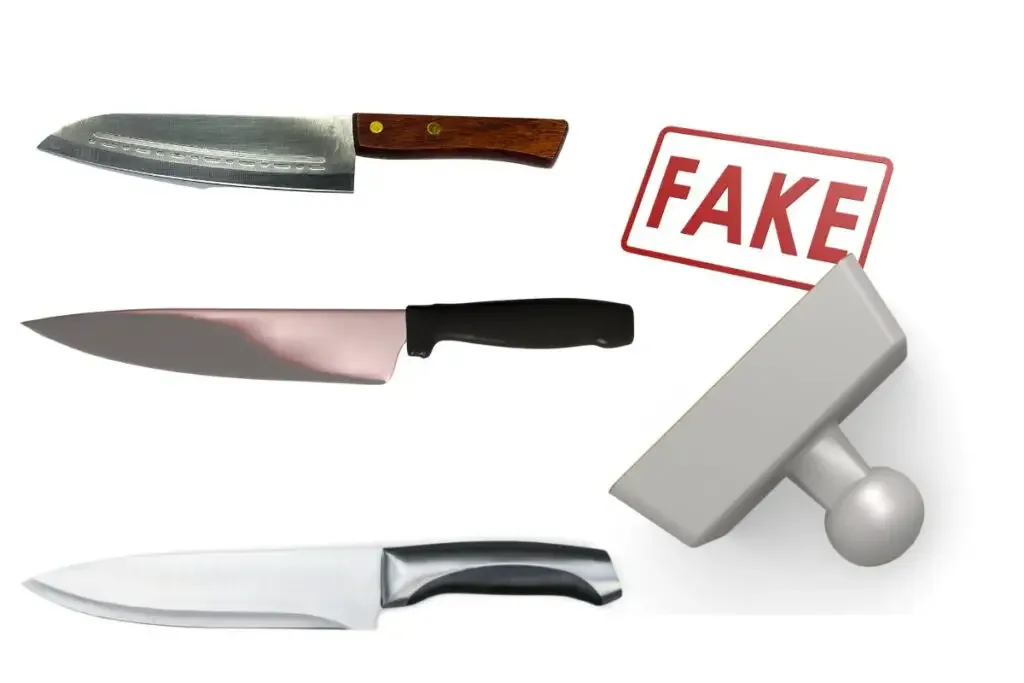As an Amazon Associate, we earn from qualifying purchases with no additional costs for you.
Japanese knives have earned a reputation for being high-quality, purpose-built knives with trademark Japanese quality craftsmanship and attention to detail. Consequently, these knives are sought after as valuable kitchen tools. Unscrupulous manufacturers and marketers try to pass off substandard knock-offs as genuine Japanese knives. How can you identify these fakes to prevent being suckered?
How to spot fake Japanese knives.
- No country of origin stipulated
- Stipulated country of origin is not Japan
- Large discounts offered
- Limited time offers
- Fake sounding Japanese name
- Japanese-style is not Japanese
- Same knife under different bands
- Promoted on cheap marketing platforms
The popularity of Japanese knives has resulted in a resurgence of fake knives on the market being passed off as the real deal. The aim of these manufacturers is to capitalize on the reputation built by the genuine product to con people into buying an inferior product at an inflated price. Knowing how to distinguish these fakes is crucial to ensuring you get what you intended.
If you are interested in checking out the best Japanese knives (made by Hayate Yoshihiro) we recommend and use you can find them by clicking here (Amazon link).

How To Spot A Fake Japanese Knife
Nobody likes being scammed on a purchase and receiving a product below standard and not the genuine article you thought you were paying for.
Unfortunately, the marketers promoting these knives are adept at appealing to our desire to get a good product at a never-to-be-repeated-again price!
Thankfully, there are some definite telltale signs that you can look for that should raise the red flag on a deal, indicating that the knife being offered is not a genuine Japanese kitchen knife.
1. No Country Of Origin Stipulated For The Knife
If the displayed packaging for the product does not display prominently that the knife is made in Japan, it should immediately be viewed with skepticism about its authenticity.
Japanese tradesmen and knifemakers are proud of their craft and their art. They will often put the country of origin on the packaging and the region in Japan, sometimes down to the village where the manufacturer operates from.
Many con artist marketers will hope that the lack of a country of origin on the packaging will go unnoticed, and they will convince you of the “genuineness” of the product with the rest of their marketing blurb.
2. The Stipulated Country Of Origin In Not Japan
If the packaging in the pictures shows a country of origin and it is not Japan, it is not a Japanese knife, even if the branding has a Japanese-sounding name.
Many of these fake marketers will try to distract you with slogans such as Japanese Damascus Steel. The steel may have been purchased in Japan, but if the knife is not made in Japan by a Japanese knife maker, the knife is not authentic.
It is highly likely that the steel is not of Japanese origin either. A Knife touted as being made from Japanese steel but bearing a “Made in China” label is a sure sign of a fake, inferior product.
3. Large Discounts Offered On The Knife Purchase Price
A knife marketed at a 50% discount or more is unlikely to be a genuine Japanese kitchen knife. Japanese knives are not cheap and would never be sold at such a huge discount.
The wise saying “if it sounds too good to be true, it probably is” should be your watchword here. A Japanese knife that normally sells for $200 would never be sold for $100 or less. The numbers simply do not make good business sense for the seller. They would be selling an expensive knife at a loss!
TIP: Japanese knives are considered as one of the best kitchen knives, but they are also quite expensive (not like the fake ones). If you are wondering why Japanese knives are worth their price, click the article below!
9 Reasons Why Japanese Knives Are Worth Their Price
4. Limited Time Offers On The Sale Of The Knife

A well-known marketing ploy is to create a sense of urgency in the buyer that they will lose out on a good deal if they delay in making a decision to buy.
This tactic is used to dupe buyers into making a rush decision and not looking too closely at the details or the fine print that would identify the product as fake.
On websites employing these strategies, you will often see a clock counting down to when the offer will expire or when the product will no longer be available.
Such tactics usually disguise the fact that the product is not all it is made out to be in the marketing content and should be viewed with a certain level of caution.
5. A Fake Japanese Sounding Name
Some manufacturers try to give Japanese-sounding names, such as Samurai, or Katana to their products to promote the authenticity of the product.
The best way to check out the validity of the name is to do a quick online search, which should reveal the deception fairly quickly.
Most authentic Japanese knife manufacturers can be traced online, and you will find reviews and references.
Always buy your knives from a reputable supplier with a proven track record and genuine reviews rather than fake, made-up customer comments.
6. Knives Advertised as Japanese-Style Knives Are Not Japanese
Many knife manufacturers produce Japanese-style knives that follow similar designs to the genuine article.
Japanese-style knives are not Japanese knives. These knives are not made from the same Japanese steel that can be hardened to levels above 60-HRC, so they will not have the characteristics that a Japanese knife is designed for.
The only similarity between these knives would be in the shape of the blade and possibly the handle design. The edge retention, sharpness, and durability are unlikely to be the same as a genuine Japanese knife made with Japanese steel.
BTW: If you want to know more about Japanese and other knives and their sharpening, check out the books listed above. These books are recommended by professional sharpeners and knife makers (Amazon links):
- Japanese Kitchen Knives: Essential Techniques and Recipes
- The Knifenerd Guide to Japanese Knives
- Knife: The Culture, Craft, and Cult of the Cook’s Knife
- Sharp: The Definitive Introduction to Knives, Sharpening, and Cutting Techniques, with Recipes from Great Chefs
7. The Same Knife Is Available Under A Different Brand Name
If you search online for Japanese knives to buy and you see knives that are obviously the same but branded differently, you can be sure that these are not authentic.
Most reputable knife makers from Japan will only sell their knives on recognized platforms or on their own websites, and the knives will not be marked with a 50% discount!
8. The Knife is Advertised On A Cheap Platform
Knives promoted on cheap marketing platforms such as AliExpress or Banggood are unlikely to be the real deal.
Most of the products offered on these sites are generally knock-offs made in China or another country specializing in mass-producing copies of top-selling products.
TIP: Buying Japanese knives can be expensive. But have you ever wondered if Japanese knives are cheaper in Japan? Find out a complete breakdown of pricing for Japanese knives in Japan in the article below:
Are Japanese Knives Cheaper In Japan? Complete Breakdown
How To Make Sure You Get An Original Japanese Knife

The only way you can be sure that you are buying an authentic knife is to buy from a reputable supplier or buy directly from a Japanese knife manufacturer.
Don’t look for cheap deals on a knife, especially a Japanese kitchen knife! If you are looking for an authentic Japanese knife, you must be aware that you will pay a higher price for a top-quality product.
Our choice: If you want to buy Japanese knife we recommend checking out the amazing Japanese knives made by Hayate Yoshihiro company. All knives made by this company are very high quality and durable. Check out their Amazon store here (Amazon link).
There are many communities and forums online where topics like this are discussed, and useful information is disseminated regarding suppliers promoting fake knives. Reading these threads can be enlightening regarding the scams promoted to con people to buy fake Japanese knives!
Impact of Counterfeit Products: Undermining Authentic Craftsmanship
The proliferation of counterfeit Japanese knives in the market poses significant challenges, not only to the consumers but also to the artisans and the industry as a whole. Here’s a closer look at the multifaceted impact of these counterfeit products.
1. Erosion of Brand Value
Counterfeit products significantly erode the value and reputation of authentic Japanese knife brands. These fake products, often of inferior quality, can lead to negative user experiences, which can tarnish the image of genuine Japanese knives, undermining years of craftsmanship and tradition.
2. Economic Consequences
The presence of counterfeit knives results in substantial economic losses for authentic Japanese knife makers. The revenue lost to counterfeit products affects the investment in innovation, research, and development, ultimately hindering the growth and sustainability of the industry.
3. Consumer Deception and Dissatisfaction
Consumers deceived by counterfeit products expect the high quality associated with genuine Japanese knives but are left with substandard and unreliable tools. This deception leads to dissatisfaction and mistrust among consumers, impacting their future purchasing decisions and perceptions of Japanese products.
4. Compromised Safety and Performance
Counterfeit knives, usually made with inferior materials and poor craftsmanship, pose safety risks due to their likelihood to break, chip, or fail during use. The compromised performance and potential hazards of fake knives can result in accidents and injuries, posing serious risks to users.
5. Legal and Ethical Implications
The production and sale of counterfeit knives involve legal and ethical violations, including intellectual property infringement and unfair competition. These illicit activities undermine the principles of fair trade and ethical business practices, affecting the integrity of the market.
6. Impact on Artisanal Craftsmanship
The influx of counterfeit products devalues the meticulous craftsmanship and the centuries-old traditions of Japanese knife-making. The artisans, whose skills and techniques have been passed down through generations, face challenges in preserving their heritage in the face of mass-produced counterfeits.
7. Market Distortion and Unfair Competition
The availability of cheap counterfeit alternatives distorts market dynamics, creating unfair competition for authentic Japanese knife makers. This distortion affects pricing strategies, market shares, and the overall stability of the industry.
The impact of counterfeit Japanese knives is profound, affecting consumers, artisans, and the industry at large. The erosion of brand value, economic losses, consumer deception, compromised safety, legal violations, and market distortions are just some of the repercussions of the proliferation of fake products. It is crucial for consumers to be vigilant and informed to protect themselves from counterfeit products and to preserve the integrity, tradition, and excellence of authentic Japanese knives.
Conclusion
A Japanese kitchen knife is a beauty to behold and an absolute pleasure to use, so long as you have the real deal!
These knives are worth the extra money you will pay to get a high-quality knife that will serve you well for years. As with any top-class product, there will always be unscrupulous wheeler-dealers who will try to sell you a knock-off at an inflated price.
Always do your research before paying top-dollar for a knife, and don’t believe the scammers offering huge discounts or limited-time offers!
TIP: Original Japanese knives are expensive but definitely worth of money. Do you know how to care about Japanese knives properly? Check out the ultimate guide about taking care of Japanese knives in the article below:
How To Care For Japanese Knives: The Complete Guide
